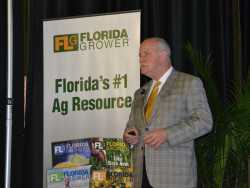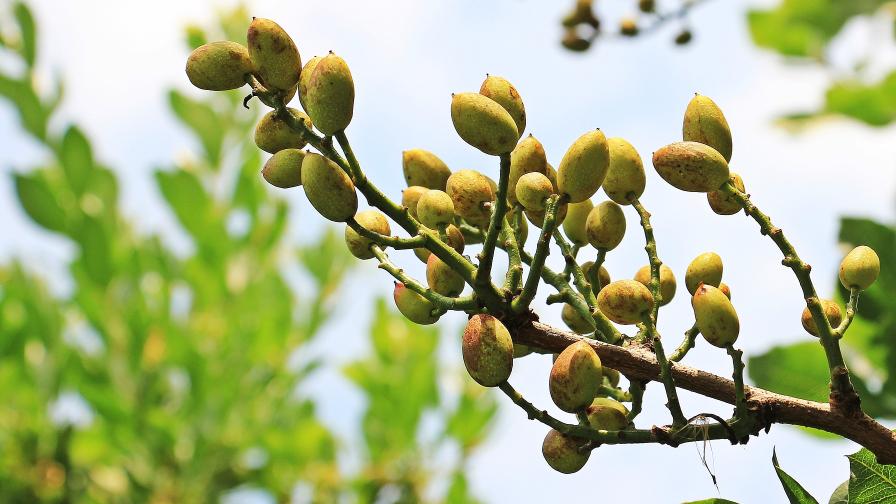Ag Tells Its Story Through Food Dialogues

When you see highly sophisticated integrated marketing campaigns from major consumer brands in popular culture, do you ever wish that the profession of agriculture could endeavor a similar effort? This may just be happening with the Food Dialogues, which are being conducted by the recently formed U.S. Farmers & Ranchers Alliance (USFRA).
You might have seen its commercial on TV. It has run on cable networks and featured a group of farmers sitting at a table with consumers having a dialogue about their profession and how they produce food. But, that’s not all the Food Dialogues (FoodDialogues.com) is up to. That was the subject of Hugh Whaley’s presentation during the recent All Florida Ag Show in Sebring. Whaley is the general manager of the USFRA.
“Our vision is simple,” Whaley told Show attendees. “Today’s agriculture needs to build consumer trust by engaging in a dialogue with influencers and opinion leaders with these significant points: We share the same values; we acknowledge concerns; we answer questions; we respect the environment; we care for animals; and we contribute to community success.”
Recently, the USFRA’s board of directors approved 10 core beliefs, which are built upon the idea that agriculture should operate to build America’s trust and confidence in modern ag practices. Whaley reported positive feedback on the core beliefs from target audiences as well as some in the media.
New Tactics
“There are no scientific facts in these core beliefs,” said Whaley. “Too often, today’s agriculture has attempted to counteract negative emotional discourse with scientific and technical facts. To no avail, I might add. These core beliefs are our passionately … and compassionately … bold comments on how we go about producing food and fiber for today’s growing global population.”
USFRA hopes to increase agriculture’s voice in key media and become a trusted source to important government policymakers. In addition, the group hopes to partner with key customer decision makers and national influencers to ensure that agriculture is represented correctly in the culture.
“USFRA Steering Committee leaders made a strategic decision early in our formative stage to not become a lobbying organization,” said Whaley. “While we have the flexibility as a 501 (c)(6) organization to engage in that if necessary, we are not now — and don’t anticipate in the future — engaging in that activity. We also decided not to engage in any way in organizational and/or public discussions involving biofuels and farm policy. These decisions have allowed us to build a strong national, regional, state, affiliate, and industry support base.”
http://www.youtube.com/v/GEHlGREhS7c?version=3&feature=player_embedded
According to Whaley, the messages many in production agriculture have been using for decades are not working. While messages, such as “safe, affordable, nutritious, and abundant,” are still valid, consumers influencers and opinion leaders feel that many of these are a given. “They expect it,” he said. “And these messages don’t build trust, as you can see from their reaction. How we say what we say is just as important. There are certain words and phrases that amplify consumer concerns. We need to use language that tells the consumer influencers and opinion leaders what we do and why without using words that raise red flags.
“Of course, in order to have a meaningful dialogue with a consumer influencer or opinion leader, we must first listen to them. Our research indicates to do that we must first acknowledge any concerns about today’s agriculture that they may have. And, it doesn’t matter if you think those concerns are invalid. If a person has a concern, they have it for their own reasons. We need to acknowledge that.”
Targeted Approach
The Food Dialogues will not attempt to focus on the entire U.S. consumer population. The group has strategically chosen to target consumer influencers and opinion leaders. Print ads will be placed in influential publications like the Wall Street Journal, New York Times, and Washington Post.
Food Dialogues Gets Industry Talking
In September 2011, the Food Dialogues Town Halls engaged more than 4,000 participants at on-site meetings and online. The consumer-facing website FoodDialogues.com also was launched that month and all along there is ongoing engagement and consumer dialogue between farmers and ranchers on social media.
Whaley added that this year and beyond marks a busy time for USFRA. The group has been providing EASE Training (Engage, Acknowledge Concerns, Share Story, Earn Trust) to growers. “Farmers and ranchers identified by our affiliates will be trained in conversation conversion,” he said. “This is not media or presentation training, but training that will teach how to engage.
This is all to begin the process of building consumer trust.”
In March, USFRA hosted the “Future of Food & Farming” in Washington, D.C., to target important influencers inside the Beltway. “There was standing room only at the event with more than 200 elected officials, Capitol Hill staffers, and industry influencers in attendance,” said Whaley. “And, more than 1,000 people participated online.”
In addition, USFRA is training 100 farmers and ranchers to participate in media interviews, panel discussions, and online activities. “These activities are meant to rebuild trust in agriculture through transparent information, factual and sourced data, and personal stories from farmers and ranchers,” said Whaley.
Whaley noted that Food Dialogues events were planned for Los Angeles in June and in New York in November. “We also will be producing a Today’s Ag documentary using a high-profile director as part of our engagement of pop culture strategy,” said Whaley. “We will be conducting a national search for Faces of Farming and Ranching to identify spokespersons to utilize with national media and the consumer influencer target audience.”
Finally, the Food Dialogues will continue its heavy engagement of social media like Facebook, Twitter, and YouTube to provide ongoing contact with the public. In addition, USFRA will work with partners to develop the next generation of research to help further refine its message to the public. All of these efforts will be measured for effectiveness in reaching the group’s targets and objectives.
Get Involved
As outlined by Whaley during the All Florida Ag Show, USFRA has a lot going on with much more planned to help communicate the important role of growers and put a human face on the ag industry. So, how can you participate in the movement?
Whaley replied, “By becoming an active participant in our effort financially and personally. You also can participate online, as well as encourage your individual association members to participate. This effort is not about big ag or medium ag or small ag. It’s about all of ag.”









